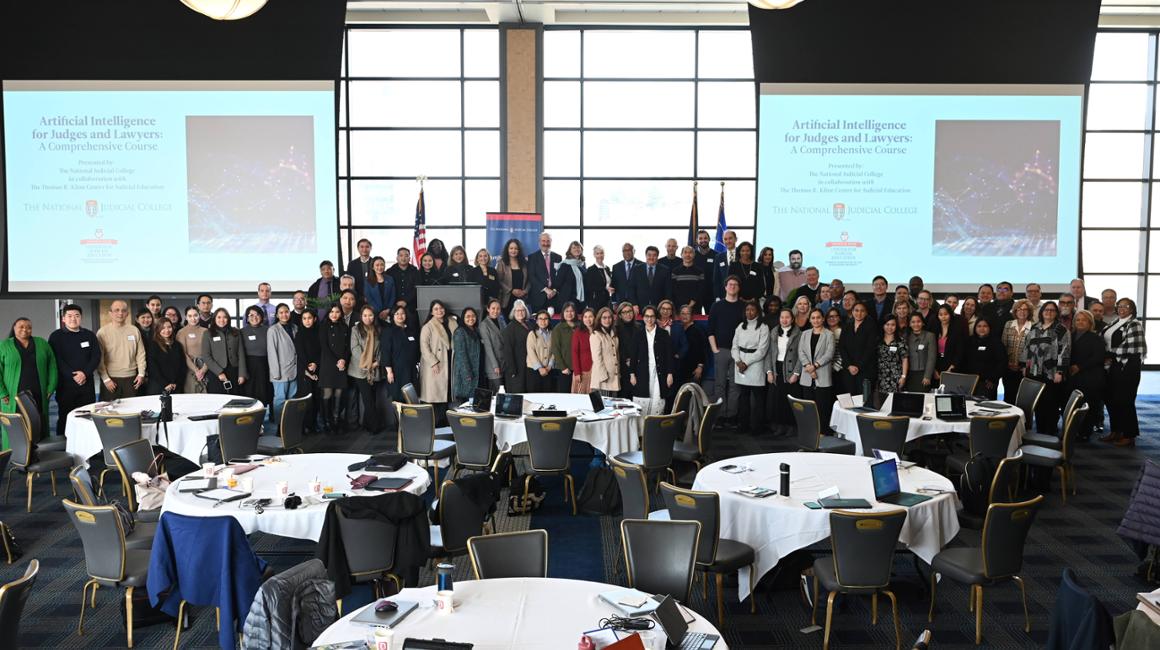Nearly 100 judges and attorneys from across the globe convened at the Thomas R. Kline School of Law of Duquesne University from December 2-5, 2024, for a four-day conference entitled “Artificial Intelligence for Judges and Lawyers: A Comprehensive Course.” The innovative and informative conference outlined the intersection of Artificial Intelligence (AI) and the law. It was a collaboration between the Thomas R. Kline Center for Judicial Education and the National Judicial College.
Ten legal and technological experts led presentations, including Duquesne Kline School of Law Dean April Barton, Professor Wesley Oliver, and Adjunct Faculty Morgan Gray. The conference featured lectures and a hands-on component designed to teach coding skills. Duquesne University President Ken Gormley delivered the conference’s opening remarks alongside Barton.
“We were honored to host this gathering with the National Judicial College, which is widely recognized as the premier center for judicial education in the United States,” said Gormley. “This collaboration on a highly pertinent topic brought practical knowledge, thought-provoking discussions, and meaningful networking to a group of jurists from across the country and from other parts of the globe. The conference was perfectly crafted to help these judges make wise and timely decisions when considering matters of law involving this emerging form of technology.”
The partnership also included fundamental instruction illuminating the ethical implications of AI in the law. “We were pleased to collaborate with the National Judicial College for this high-quality program and provide a deeper understanding of the complicated and ever-changing world of technology,” Barton said.
Erin Karsman, Director of the Thomas R. Kline Center for Judicial Education and the Appellate Moot Court Program, co-coordinated the popular conference, working alongside Keith R. Fisher, Distinguished Fellow at the National Judicial College. The President of the National Judicial College, the Honorable Benes Z. Aldana, was in attendance, underscoring the significance of the event in addressing the evolving relationship between AI and the legal profession.
“Artificial Intelligence is evolving rapidly and is reshaping the practice of law,” said Barton. “It is critical for judges and attorneys to understand both the potential of AI as well as its limitations.”
Lecturers and attendees traveled internationally and from across the United States to attend the event. It was a special honor to have Chief Justice Robert J. Torres of the Supreme Court of Guam and Justice Shannon Bacon of the Supreme Court of New Mexico both lecture and participate in the event.
“We had an exceptional turnout,” said Karsman. “Of the over 90 judges and attorneys in attendance, 40 traveled from the Philippines, and one of our expert presenters joined us from the Netherlands. We were also delighted to welcome participants from across the country, including judges from Michigan, Illinois, Idaho, California, Nevada, Nebraska, Georgia, and Virginia, among others.”
Beyond discussions of AI and the law, fostering camaraderie was a central theme of the event. The Kline Center hosted a lively reception on the first evening, where guests had an opportunity to connect. The conference concluded with a commencement ceremony. “The Kline Center was honored to co-host such an informative, collegial, and special conference. At the close of the event, our distinguished colleagues from the Philippines went on the stage and sang a Christmas carol in Filipino, which was a memorable end to a meaningful conference,” said Karsman.
News Information


